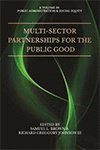
Multi-Sector Partnerships for the Public Good
Edited by:
Samuel L. Brown, Old Dominion University
Richard Greggory Johnson III, University of San Francisco
A volume in the series: Public Administration & Social Equity. Editor(s): Richard Greggory Johnson, University of San Francisco.
Published 2023
What is the way that societies improve and solve problems? What is the purpose of business in society? Is there a role for markets and business in issues of civic good, justice, equality, education, environment, health or collective action? Current economic principles, which underpin our trust in markets are not value neutral. Therefore, how we design “market solutions” to problems should be the focus of vigorous and open debate. Multi-sector Partnership is a concept that has re-focused us on the meaning of the goods and social practices we value as citizens in a global society. Multi-sector partners emerge in society to offer innovative approaches to dealing with pressing, yet complex, social, economic and weather-related 21st century challenges.
Multi-sector partnerships, loosely defined as activities with an embedded social purpose, is about using skills from a range of sectors to craft innovative responses to address social problems. It aims at social impact but does not exclude economic wealth creation. Thus, it is not limited to the non-profit or social sectors but seeks to mobilize and align interests of diverse stakeholders in the social, public and private sectors by creating non-financial incentives for collective action. Multi-sector partnerships involve recognizing that social problems are potential opportunities for collaboration, building on existing social networks, harnessing market forces that combine and mobilize resources, inciting positive change in various domains, and designing solutions for sustainable development.
The purpose of this edited volume is to provide academic and practitioners with the essential conceptual frameworks and tools for creating successful Multi-sector ventures, initiatives, programs or partnerships that seek to tackle global social issues and collective action problems.
CONTENTS
Introduction, Samuel L. Brown and Richard Greggory Johnson III. Public Value and Cross-Sector Collaboration: Meaning, Gaps, and Solutions, Kouliga Koala. Public-Private Partnerships Through Tax Increment Reinvestment Zone Financing in the City of Houston, Texas, Andrew Ikeh Emmanuel Ewoh. Sustaining Transformative Community-Campus Partnerships Through Interpersonal Accountability, Honoring Community Agency, and Shared Imagining, Star Plaxton-Moore, Angeline Vuong, and Jacqueline Ramos. Developing A Community-Centric Model Using A Multi-Sector Partnership Process for Urban Development: A Case Study of the Historic Upton Community Revitalization in West Baltimore, Al G. Gourrier. Understanding Multi-Sector Collaboration for Accountable Care Organizations: Models of Care for Mental Health Collaboratives, Tiffany Henley and Samuel L. Brown. Tiffany Henley and Samuel Brown; Risks and Rewards for Public Value: A Public Private Partnership to Expand Rural Broadband in the State of Kentucky, Ashley Ireland. Multi-Sector Collaboration and Workforce Housing in Minnesota, Kristen Norman-Major. An Economic Model to Develop Sustainable Brazil Production in Peru, William Riggs. Collaborating for Affordable and Accessible Housing Opportunities: Pluralism, Systems, and Policy, Tracy Schober. Teaching #MiamiTech: A Case Study of the Public Interest Technology Fellowship at Florida International University, Agatha Caraballo and Cristina Rodriguez-Acosta. About the Authors.
-
Paperback979-8-88730-119-8
Web price: $45.04 (Reg. 52.99)
-
Hardcover979-8-88730-120-4
Web price: $80.74 (Reg. 94.99)
- eBook979-8-88730-121-1

- BUS019000 - BUSINESS & ECONOMICS: Decision-Making & Problem Solving
- BUS020000 - BUSINESS & ECONOMICS: DEVELOPMENT: Business Development
- BUS024000 - BUSINESS & ECONOMICS: Education
-
 Alternative Methods of Judging Economic Conflicts in the National Positive and Soft Law
Alternative Methods of Judging Economic Conflicts in the National Positive and Soft Law
-
 Climate Governance in International and Comparative Perspective
Issues and Experiences in Africa, Latin America, and the Caribbean
Climate Governance in International and Comparative Perspective
Issues and Experiences in Africa, Latin America, and the Caribbean
-
 Conflict Management and Leadership Development Using Mediation
Conflict Management and Leadership Development Using Mediation
-
 Practical Wisdom for an Ethical Evaluation Practice
Practical Wisdom for an Ethical Evaluation Practice
-
 Public Administration & Social Equity
Public Administration & Social Equity
-
 Running with Scissors
Leading in Uncertainty
Running with Scissors
Leading in Uncertainty
-
 The Only Constant in HRM Today is Change
The Only Constant in HRM Today is Change

